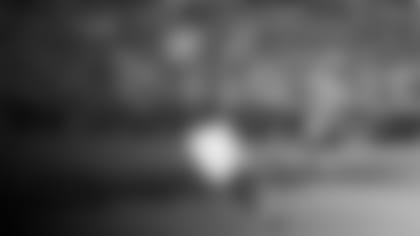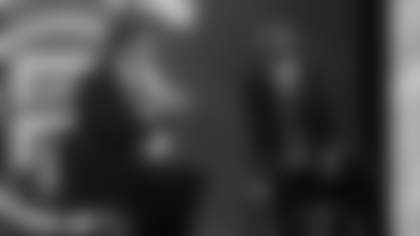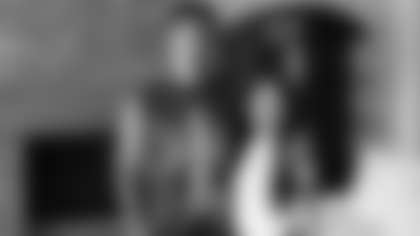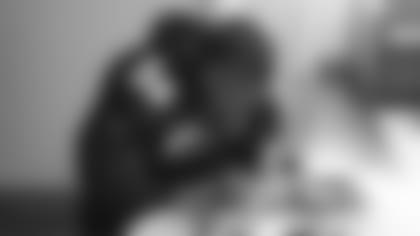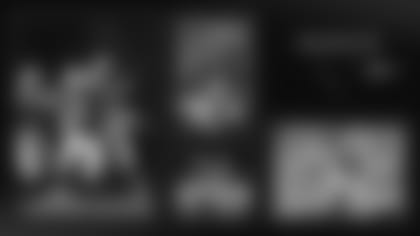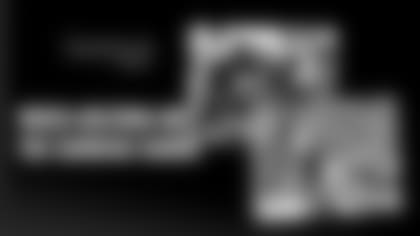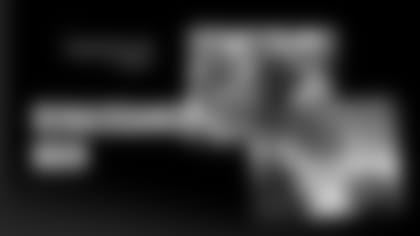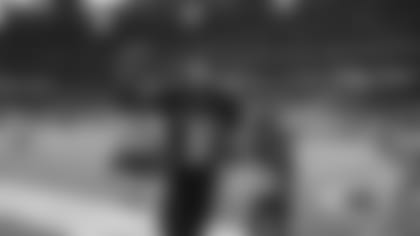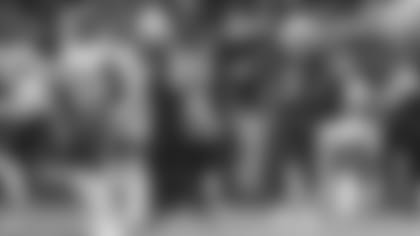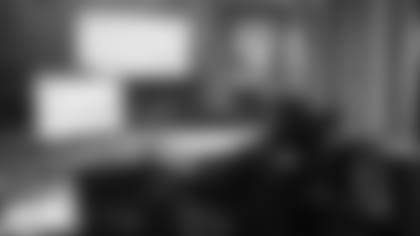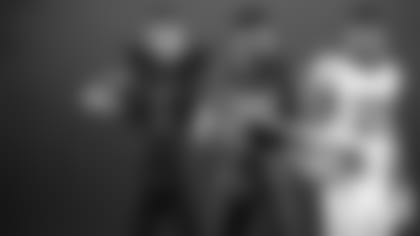Larry Fitzgerald, with a year left on his contract, is working year-to-year on his career. Retirement was a consideration after the 2016 season and the wide receiver figures to go through the same process after 2017. His role has changed significantly since he was a rookie in 2004, but he's had his two most prolific seasons for receptions the last two years. His numbers will undoubtedly put him in the Hall of Fame one day.
The talk of Canton emerged for the first time back in the 2008 season – more specifically, that postseason, a magical, improbable run to the Super Bowl by the Cardinals. The team was carried by Fitzgerald, who had from start to finish arguably the greatest postseason by a single player. In four games, Fitzgerald had 30 receptions for 546 yards and seven touchdowns. His fourth quarter of the Super Bowl nearly led the Cards to a shocking title.
Almost a decade later, Fitzgerald doesn't have much use to look back. "That's old news," Fitzgerald said in a text. "It's time to create new ones." There were plenty of others watching Fitzgerald curate greatness. This is the story of that postseason run, told by those who were there.
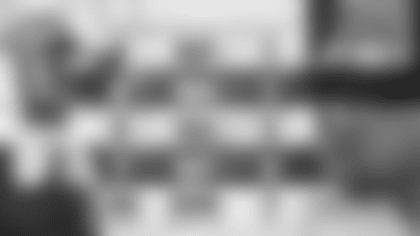
The Cardinals clinched the NFC West title with a win over the Rams in Week 14 and were trying to build momentum heading into the postseason. Instead, they lost their next two games to drop to 8-7 after a 7-3 start. In Week 16, the Cards were obliterated in New England, losing 47-7 in the snow. Fitzgerald's then-personal-long 78-yard TD catch from Matt Leinart, giving him three receptions for 101 yards and a score in that game, was the lone bright spot.
Todd Haley, Cardinals offensive coordinator: We came back and our first practice was one of the coldest days I've ever felt in Arizona. It was bone-chilling and rainy, and (head coach) Kenny (Whisenhunt) actually canceled practice and I was like, '(Expletive) that, we're staying' and stayed out there and slopped around. That morning, I had to ask (quarterback) Kurt (Warner) permission if I could swear, and I pushed the chairs around and MF'd everybody. Everybody looks at it different, but I think those were things that had to happen. We had a few guys who felt a little too good about themselves.
In the finale, a home win over the Seahawks, Fitzgerald had 130 yards and two touchdowns on five receptions. The Cardinals felt better about themselves, despite national criticism about getting a home playoff game with their 9-7 record.
Ron Wolfley, Cardinals radio analyst: People were saying that this was the 'Worst playoff team ever.' Who was that, Cris Collinsworth? Not here to argue whether that was accurate or not, but I remember, you always had the retort, 'Yeah, but we've got Larry.'
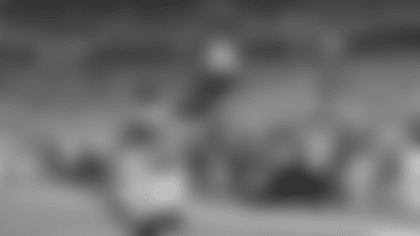
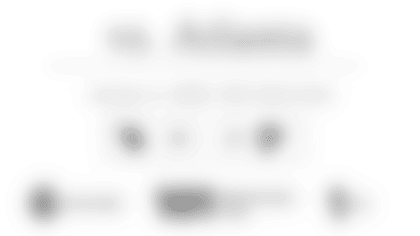
The Cardinals were hosting a Wild Card game, although the Falcons – led by rookie quarterback Matt Ryan -- had a better record. The Cardinals' first big play was a 42-yard flea-flicker to Fitzgerald, who outleaped two defenders for a touchdown in the first quarter of a scoreless game.
Dave Pasch, Cardinals radio play-by-play: That was an incredible catch in that moment. Ken Whisenhunt was mic'd up, and he's telling all of his assistants, 'Wow, it's loud in here.' Then after that play, it was so loud, you couldn't hear yourself think.
Steve Breaston, Cardinals wide receiver: He made those plays, even in practice. Kurt put it out there, but it was something Fitz was doing all year. It was a great catch, but it wasn't something that surprised the people that worked around him. (That catch) really started it off, that great run that he had. That momentum carried him all the way through the Super Bowl.
Jerheme Urban, Cardinals wide receiver: It not only ignited him, it ignited our entire team. The stadium was going crazy, and it kind of gave everybody the confidence, 'We're in the dance, we can make big plays like everybody else, let's believe in ourselves.'
Haley: As the year went on, Kurt – one of the best if not the best progression passer ever, with great vision -- the big sell was getting Kurt to trust, that even if Larry was covered, you've got to throw it. That went against the way he was raised and made a name for himself. But you really saw that come to life in the playoffs.
Kurt Warner, Cardinals quarterback: I never tried to get away from what my (progression) rules were because I knew I could get in trouble. But there are other factors. Larry as a receiver, what he is doing, his catch radius, my strength being my accuracy. A lot of people look at that flea-flicker and say, 'Man, you threw it into double coverage.' But if you look, really no one was in position to cover him as long as I put it where the ball needs to be. … During that run he was making all of those catches. They were 'educated forces,' if there is such a thing.
The Cardinals eventually seal the win on a pass from Warner to tight end Stephen Spach to convert a third-and-16. Fitzgerald ends up on the cover of Sports Illustrated, the first of three straight – albeit regional – covers on the magazine for the team. Two featured Fitzgerald. The headline on the initial cover? "Arizona is DANGEROUS."
Mark Dalton, Cardinals vice president of media relations: Short of Pat Tillman, I couldn't remember the last time we were on the cover of Sports Illustrated.
Donovan McNabb, Eagles quarterback, when it was noted SI called the Eagles dangerous on a cover: Well, they called the Cardinals dangerous, too. It's a regional copy. Everybody is dangerous.
Freddie Kitchens, Cardinals tight ends coach: Anquan (Boldin) was viewed as the emotional guy, the team leader, and Fitz was kind of the good player off doing his own thing. What you saw from him and got the sense from him, he was the type of player who would always be there on the biggest of stages.
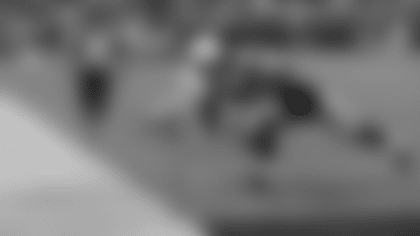
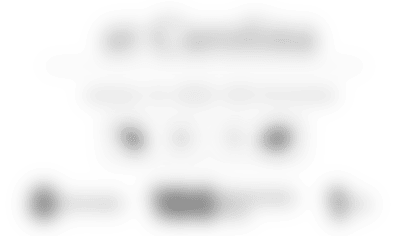
The game turned into a nightmare for Panthers quarterback Jake Delhomme, who had six turnovers. But it was just as much about Carolina's inability to cover Fitzgerald, who had 151 yards receiving in the first half – a Cardinals single-game playoff record, in just two quarters. As against Atlanta, Fitzgerald's big game began with a heave downfield in which he beat two defenders, a play called "Fake toss, 339 taxi pass." Haley came up with the play on the flight to Carolina and the team never actually practiced it beforehand.
Kitchens: That play was put in on the plane, going to Carolina. I remember Todd showing it to me, saying, 'What do you think?' I'm like, 'Yeah, at worst, throw it up to Fitz.'
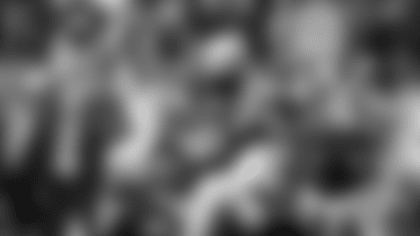
Haley: This play, the one I drew on the napkin, I saw it and thought, 'We'll have a chance to at least get Larry free.' The funny thing was the walkthrough was at their stadium on the outside turf and all their offices faced (the field), so we couldn't even practice it. We couldn't walk through it but we talked through it and thank goodness we hit it. Larry, he got so much double-coverage that finding ways to get him in single and one-on-ones was hard, but he was generally going to make the plays because of his greatness.
Breaston: We were on the plane right before we got there, and Coach Haley is like, 'You're going to chip (defensive end Julius) Peppers off the edge and then go to the flat. I was in motion, I come on down, and Peppers drops in pass coverage. I was like, 'Man, what do I do now?' I stalled, and then I leak out into the flat and that's when Larry jumped over two or three people. Funny how that turned out.
Fitzgerald's other iconic play was his stretch for the pylon on a 29-yard crossing route cleared out by Breaston and Urban going deep, giving the Cardinals their insurmountable 27-7 halftime lead. This was all done without Boldin, the Cards' other Pro Bowl receiver who was sitting out with a hamstring injury.
Wolfley: That is where I believe, if I am not mistaken, I started to call Larry the Japanese Fighting Fish. Deadly and single-minded of purpose, right? It's because of plays like that.
Breaston: It seemed like Fitz was open the whole game. Even after the catch he made against like three people early in the game, I'm turning my head around, wondering where the ball was going, and he's streaking across the field. It surprised me, because you'd think, with Q being down, you'd try to take that away.
Urban: Steve and I used to joke, the reason those guys caught all the balls in four-wide stuff was because we were on the other side taking all the coverage.
Adrian Wilson, Cardinals safety: As soon as we got that win, in the locker room, the look in everyone's eyes were, 'We're going to the Super Bowl.' It didn't matter who we played, from that win, we felt we were destined to win the Super Bowl. On the charter (flight) after the game, Me, Karlos (Dansby), Darnell Dockett are talking. Fitz sat across from me on the plane, and we're talking to him and (guard) Reggie Wells. Usually Fitz goes to sleep after the game. Usually. This particular game, he was up. You get a sense of how players are and what makes them tick, and Larry is a competitor, but at the same time he was so proud of everyone else and how they played. We just knew we were destined to play in the Super Bowl.
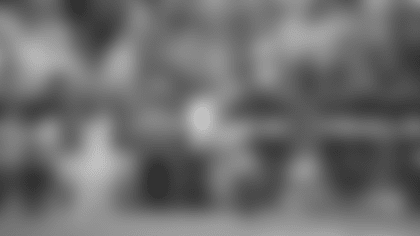
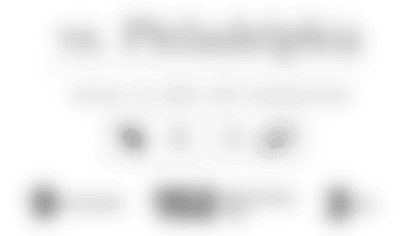
The Eagles, who like the Panthers had knocked off the Cardinals earlier in the season, spent the week saying how they couldn't let Fitzgerald beat them. Then, like the previous two games, Fitzgerald exploded in the first half with three touchdowns, including a 64-yard score on a J.J. Arrington-to-Warner-to-Fitz throwback double pass.
Warner: I was a guy who hated trick plays, thinking we could fool somebody. I always wanted to say, 'OK, I believe we can out-execute them. Even with the creativity, it wasn't like they were just high hopes. The flea-flicker (against Atlanta) he went up against two defenders, the Carolina catch (designed on the plane) was against two defenders, the double pass (in the NFC Championship), the safety was right there and he goes up around him.
Pasch: That was in the end zone by us, where our booth is, and it just felt like it was Larry catching the ball and there was no one else on the field but Larry and then 80,000 fans. That's what it felt like.
Urban: The quarterback has to have a security blanket. And the stats show Larry was that for Kurt. Kurt would throw to Larry and Larry was making every play and it was like that old NBA Jam (video game), 'He's on fire!' Larry got on fire.
Wilson: It's one of those things, it doesn't matter what you do defensively, if a guy is hot, you're not going to stop him. Again, those are routine things Fitz does. It wasn't like he wasn't the third pick in the draft, wasn't an all-American in college. Larry is a great player. Then he starts to evolve and all that talent and the work he put in comes together, you don't have a chance. You're sitting there and you're like, 'Damn. I'm playing with a Hall of Fame player.' You don't realize it until that moment.
Kitchens: Still to this day, if you throw Fitz the ball inside the 10-yard line, I don't care how many guys are around him, he is for the most part going to get that ball in the end zone. That's the way he played all over the field during that run. Every time he caught the ball, it was, 'Is this ball going to the house?'

The Cardinals built a 24-6 lead, but eventually fell behind 25-24 before going on a dramatic touchdown drive for the game-winning points. Fitzgerald had three catches on the nearly eight-minute march, which ended with a Tim Hightower 8-yard score on a screen pass.
Breaston: It was so loud, and it's kind of a blur. You are a part of history, first time an organization is going to a Super Bowl. As much as we were in the moment, the goal was for us to go and win the Super Bowl. I just have this image of me and Jerheme Urban holding up USA Today with "NFC Champion" something like that. That's always been in my head.
Dalton: Larry was still in the young, I'm-not-embracing-the-media-spotlight thing. He had never gone to the interview room. And there are pictures of Kurt and him hugging, but I remember cajoling him to go into the room, and then Kurt walks in and sees Larry at the podium, and Kurt even goes, 'Larry at the podium?!?' Like, 'Wow, we really have hit the big-time.'
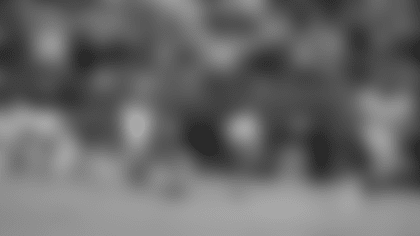

Larry Foote, Steelers linebacker: Going into that first meeting (of prep), it was about how we were going to contain Fitzgerald. Ike Taylor was our shutdown corner, but even the plays he made, there were safeties above. That whole week was how we were going to contain him. (Then) he single-handedly almost beat us.
Wilson: Going into that first off-week, when we had time to kind of decompress for this game, Fitz, Kurt, Anquan, Steve Breaston and Tim Hightower are outside throwing routes on air, while everybody is inside lifting and watching film. They were in the moment. Kurt has been there. So Kurt had a feeling in his head that everything needed to stay crisp. We were all cool with that.
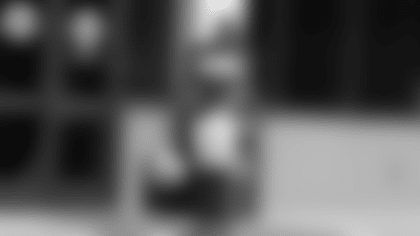
Fitzgerald had dominated in the first half of each of the first three postseason games. In the Super Bowl, he had just one catch for 12 yards through three quarters, and wasn't targeted in the third at all. The Steelers built a 20-7 lead, highlighted by the 100-yard interception return on the final play of the first half, when Fitzgerald – among others -- was unable to stop the less-than-speedy James Harrison short of the goal line with no time remaining. Fitzgerald's effort was slowed at one point because teammate Antrel Rolle was on the sideline watching and briefly got in Fitzgerald's way.
Kitchens: At halftime, the locker room was very, very quiet. It's a longer halftime, and it was deathly quiet. I'm like, 'I've never seen this.' Hell, we were down in Philly, down in New England down (in the regular season) but never was it that quiet. It was almost like a calm before-the-storm thing. We knew what Pittsburgh was. We just beat them the year before. It was an eerie-type feeling.
Haley: The deal was, we couldn't block them. So it was, how do you stay in the game and not get Kurt killed? Because if Kurt's out, you're done. It was try to get to that point. Obviously if the Harrison thing doesn't happen and we throw a touchdown (on that play), the game is different and we're probably in a tighter game for longer. But when they went ahead and got up, what are you saving Kurt for? We let him loose and went to the no-huddle signals package where we are putting the formations out there and (Kurt) is trying to give the best signal. Kurt was like, 'We should've done it the whole time.' We were going to do it, but I watch those guys come off the edge every play and Kurt was going to get killed. And he still took some giant shots.
Working in an offense with more tempo, Fitzgerald exploded, making an impressive jump-ball touchdown catch over Taylor and later, improbably, splitting the Steelers defense for a 64-yard touchdown catch-and-run that gave the Cardinals a 23-20 lead with 2:37 remaining.
Ike Taylor, Steelers cornerback: I had a great jam. My clock was ticking, I was like, 'OK, someone's about to get to the quarterback.' He is still patting the ball. And as soon as I looked in for a split second, Larry came under. As a corner, if I just would have stayed with him and looked at him the whole time, but that slight hesitation, looking to see what the quarterback was doing, gave him a step. Now I'm in chase mode.
Breaston: They are supposed to protect the inside. Once you get inside, plays happen. We practiced against (that defense) throughout the course of the year, just preparing to play against two-man because of the receivers we did have. I don't know what (40 time) Larry ran at the time or before, but everybody said back home (in Pittsburgh), he was running a 4.2.
Fitzgerald (in April, 2009): People don't think I can run. … But if I can catch the ball running – hey, I ran a 4.44 coming out of college. I can go when I need to go. I was happy to catch that pass running.
Pasch: The end zone he's running into is the end zone where the Cardinals fans were, our booth was over there. There was a booth next to us full of people that worked for the NFL, and they were cheering.
Foote: We got humbled. To this day, we were a record-setting defense as far as our stats. Up until that last quarter, until Fitz put his Superman cape on, the whole year, number one in everything, led a team to the Super Bowl, and now you are on the sideline, with our fingers crossed, hoping that Ben (Roethlisberger) could win the game for us. When you get the ring, it don't matter, but that was a humbling fourth quarter.
Warner: First and foremost, I'm kind of thinking how everybody in the world, right now, thinks the Cardinals are going to win the Super Bowl for the first time. People are actually saying, 'The Cardinals can win the Super Bowl.' Personally, I remember running to the sideline and everyone is going crazy and saying, 'Oh my gosh, you just won the Super Bowl' and I remember telling everyone, 'Get away from me and relax, there's a long way to go in this thing. I've been here before.'
Wolfley: 2:37. 2:37. That is a number I will never get out of my head.
Pasch: I thought they were going to win. I actually remember, you know how NFL Films replays (the announcer call), I thought, 'I'm not going to write anything out, because if I do, they'll lose. Don't want to jinx it.' So I didn't write anything down. And after that (64-yard score), I thought 'I better get something ready.' I hadn't put pen to paper, but I started thinking, 'OK, what am I going to say here?' Then it got to third down and I started to write it down and of course, Aaron Francisco slipped.
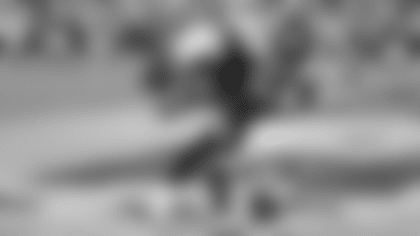
Francisco, a safety, slipped on a 40-yard catch-and-run by Santonio Holmes, setting up Holmes' toe-tapping touchdown for what turned out to be Pittsburgh's game-winning score. Fitzgerald made an excellent 20-yard reception in the closing seconds to give the Cardinals hope for a Hail Mary score. But Warner was stripped before he could get a throw off.
Urban: Before the snap, the (2007 Hail Mary TD to Fitz against the 49ers) flashes in my head, along with everything else Larry had done in the playoffs. It would have been fitting, if the ball would've gotten off, there's not a doubt in my mind he would have made that play.
Kitchens: I had total confidence. I thought we were going to catch the ball. I really did. In my mind, I would've bet you anything you wanted to that Larry would have caught the ball. … I still don't know why we didn't get the ball off. No one talks about that. We were on the 50-yard line. I kept thinking, 'It's not supposed to end like this.'
Haley: After that game I'm at the Combine, and I am walking to the workouts (as new coach of the Chiefs) and I am alongside Dick LeBeau (Steelers defensive coordinator), who I did not know. We start talking. We end up sitting together (in the dome) and we're talking. Once Ben hit Holmes to go ahead, we make the big play to Larry which was a phenomenal play, and if we win the game that play was as good as any that I've seen, and now we've got the (attempt at a Hail Mary). Dick LeBeau is telling the story now and saying 'I'm glad (LaMarr) Woodley got to Kurt, because Troy (Polamalu) told me Larry had him boxed out with his big butt and he didn't know if he could make a play.'
Warner: You hate to find yourself needing a Hail Mary to win it. Having Larry, playing the way he did, there was at least a higher percentage than when you normally throw one. But I won't say that, if I had thrown it up, we were definitely coming down with it.
Dalton: I was getting Larry to the (post-game interview) podium, and the crush of all these people, and Jesse Jackson was there. The randomness of it. Jesse Jackson wanted to make sure he saw Larry and congratulate him, even in defeat, on this amazing run they had. They are talking and expressing whatever sentiments and at one point, Jesse Jackson says, 'I want to stay in touch, what's your number?' and I look up and there is a giant boom mike, and all these people around. I'm looking at Larry, telling him (mouths the word) 'no.' So he whispers it in Jesse Jackson's ear.
Wolfley: I kid you not, in the past, I have woken up from a deep sleep, thinking about 2:37.
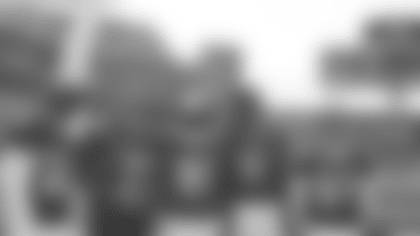
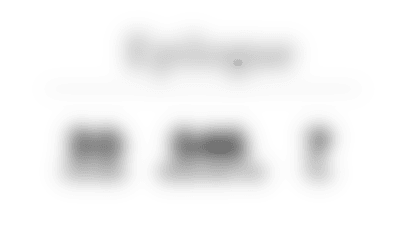
Fitzgerald (in April, 2009): I just think the stage was different. I felt (2008) was probably my most consistent in terms of week-in, week-out putting together solid performances. The years Todd (Haley) was here, that's what he always talked about. 'Don't be the yo-yo guy. Be a consistent player, be someone the players and coaches can count on.' I pride myself in that. Throughout the playoffs, that was the most fun time in my life.
Dalton: In those days, we'd come back from road games and we lived really closed together. We'd take the bus back here (to the team's Tempe facility) and he'd be, 'Hey, can I have a ride home?' I'd give him a ride home. That's kind of what we did. When we got back from Tampa, he asked, 'Can I have a ride home?' We took the busses back, and there were helicopters and people waiting and we were unloading the busses and it was a (mess), it was like the Beatles at LaGuardia. And he was like, 'Hey where's your car, let's get out of here.' We pulled up to his neighborhood and there's a gate in the front with balloons and signs on it, 'Welcome home Larry.' Then the phone rang just as I am dropping him off. He whispers, 'It's the President, I'll talk to you later.' President Obama had called. Those were different times.
Photos from Larry Fitzgerald's historic 2008 performance in the playoffs.
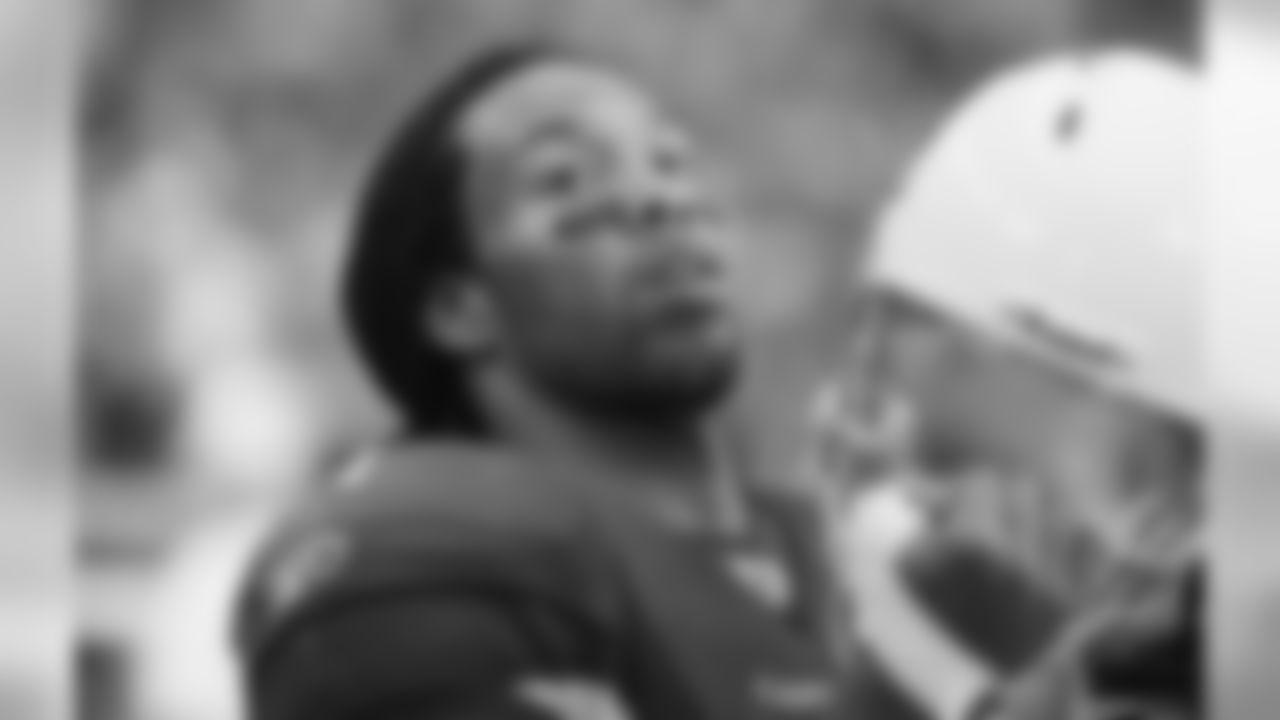
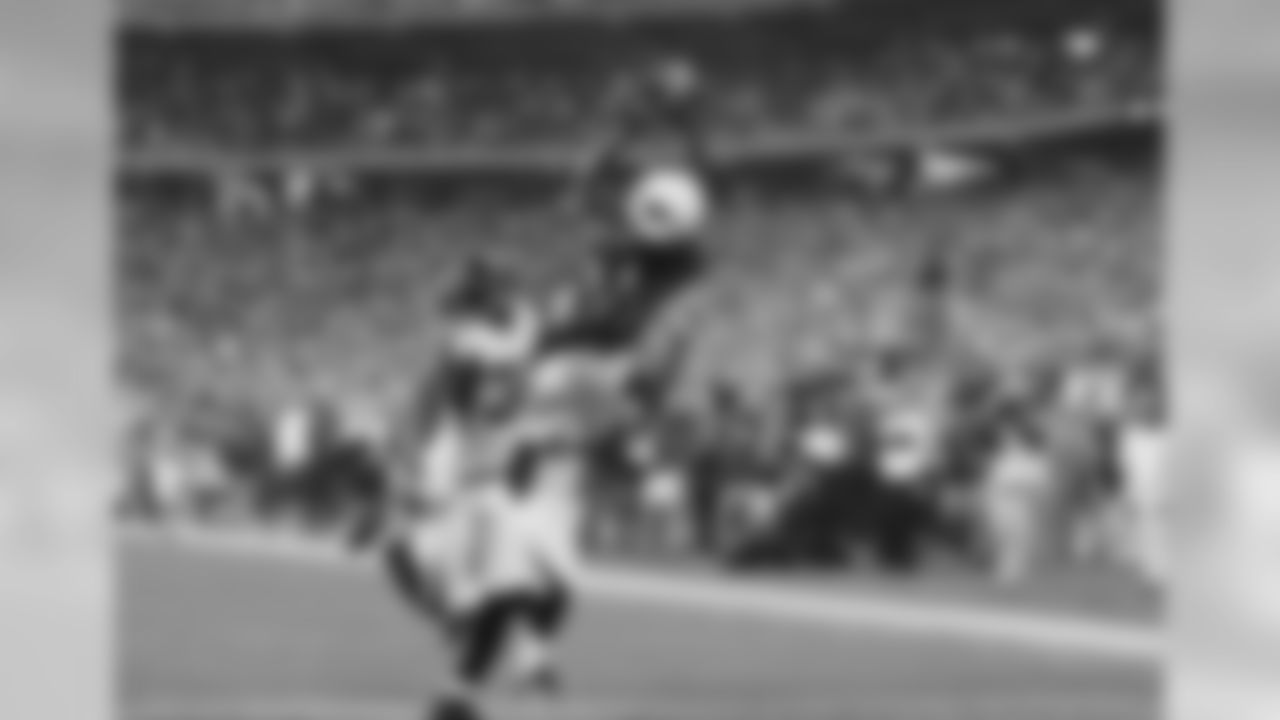
Hauling in a flea-flicker touchdown against the Falcons
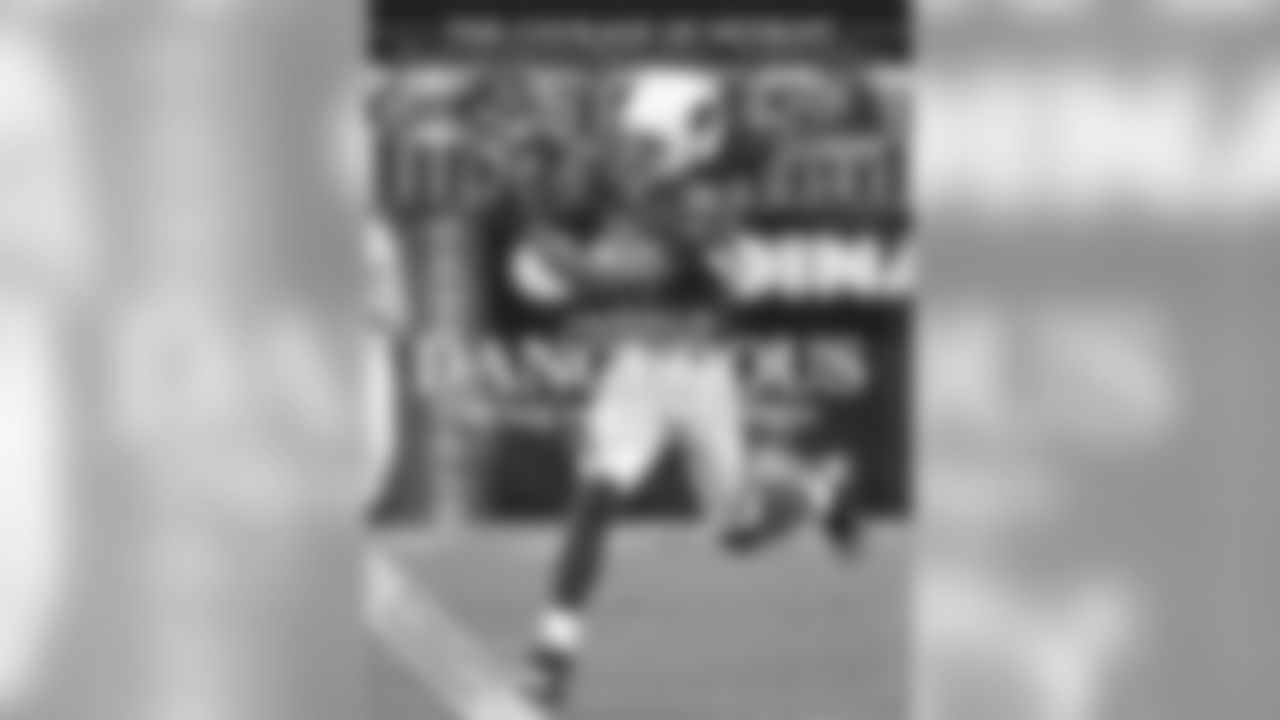
Sports Illustrated's cover after the Atlanta win
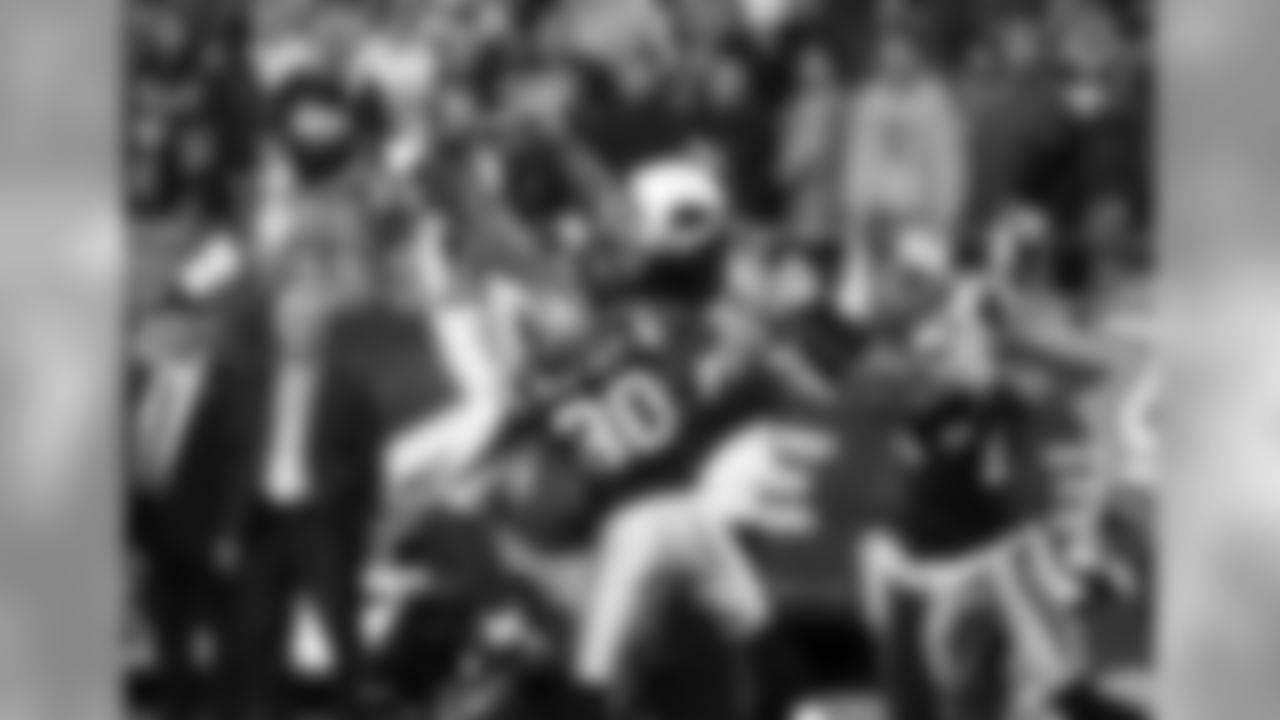
Fitzgerald beats a pair of Panthers for his bobbling. spectacular catch in Carolina
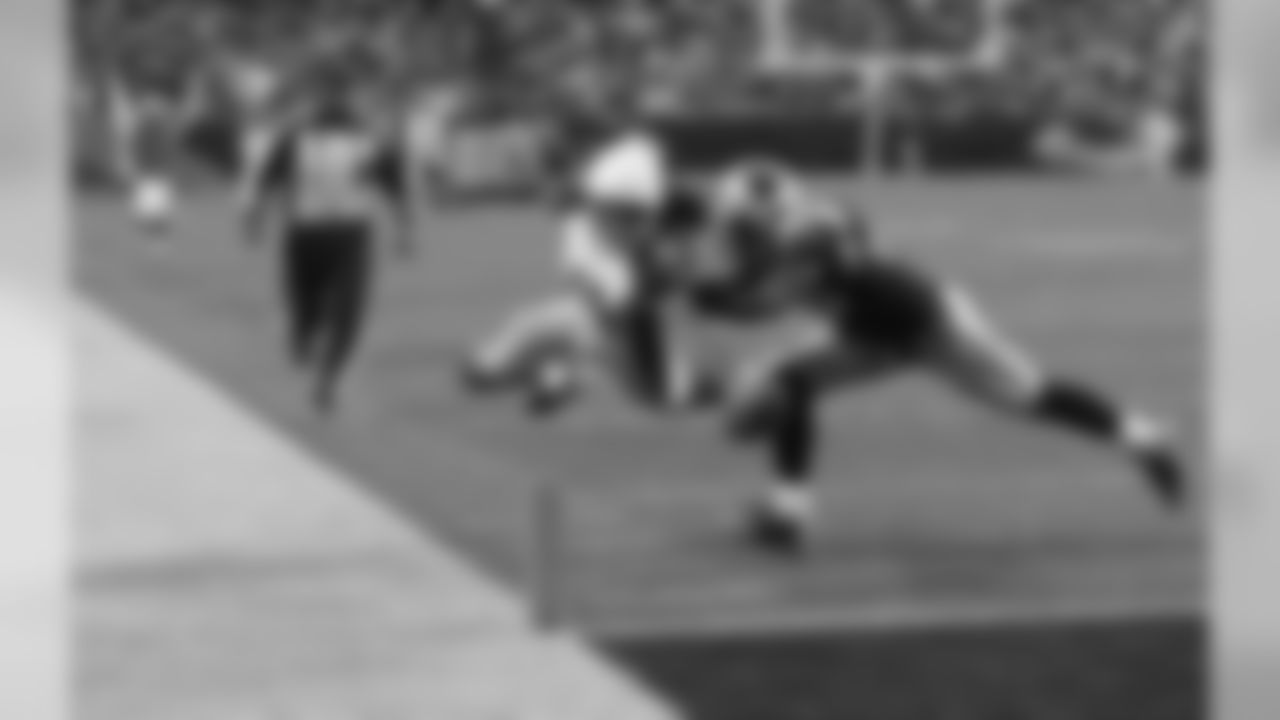
Fitz dives for the pylon for his iconic TD in Carolina
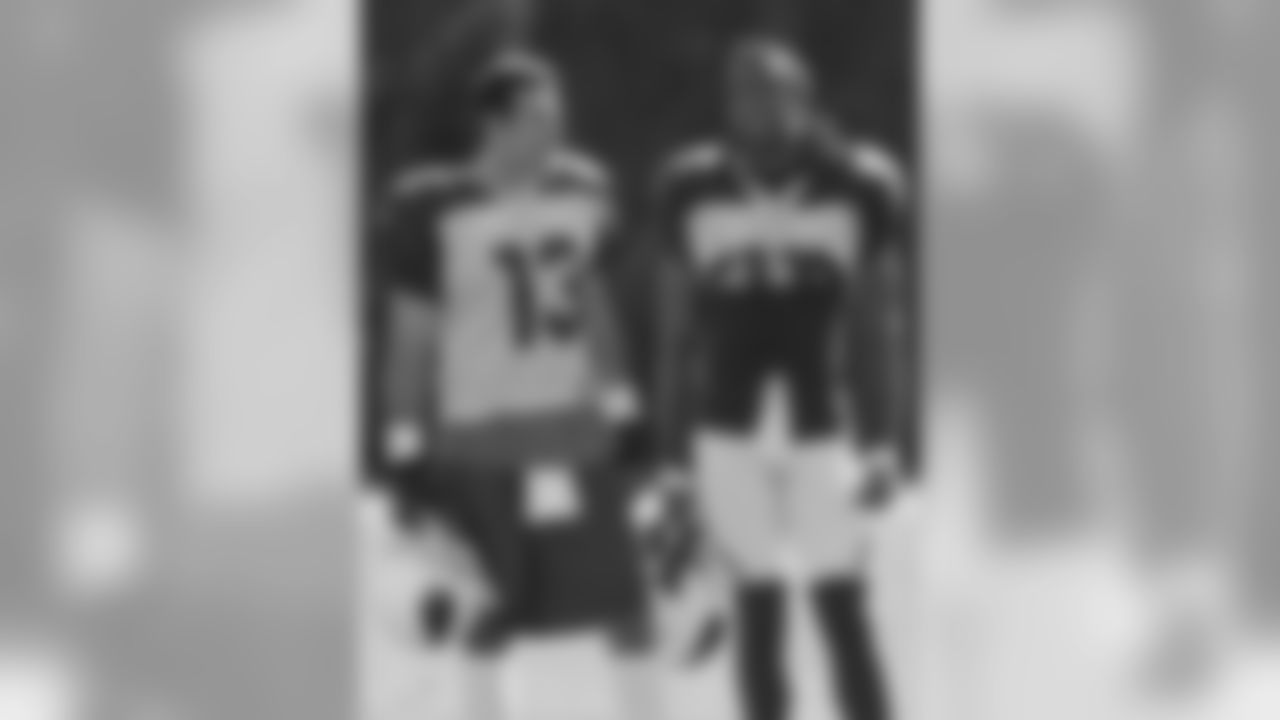
Kurt Warner and Fitz share a moment during a practice prior to the NFC Championship
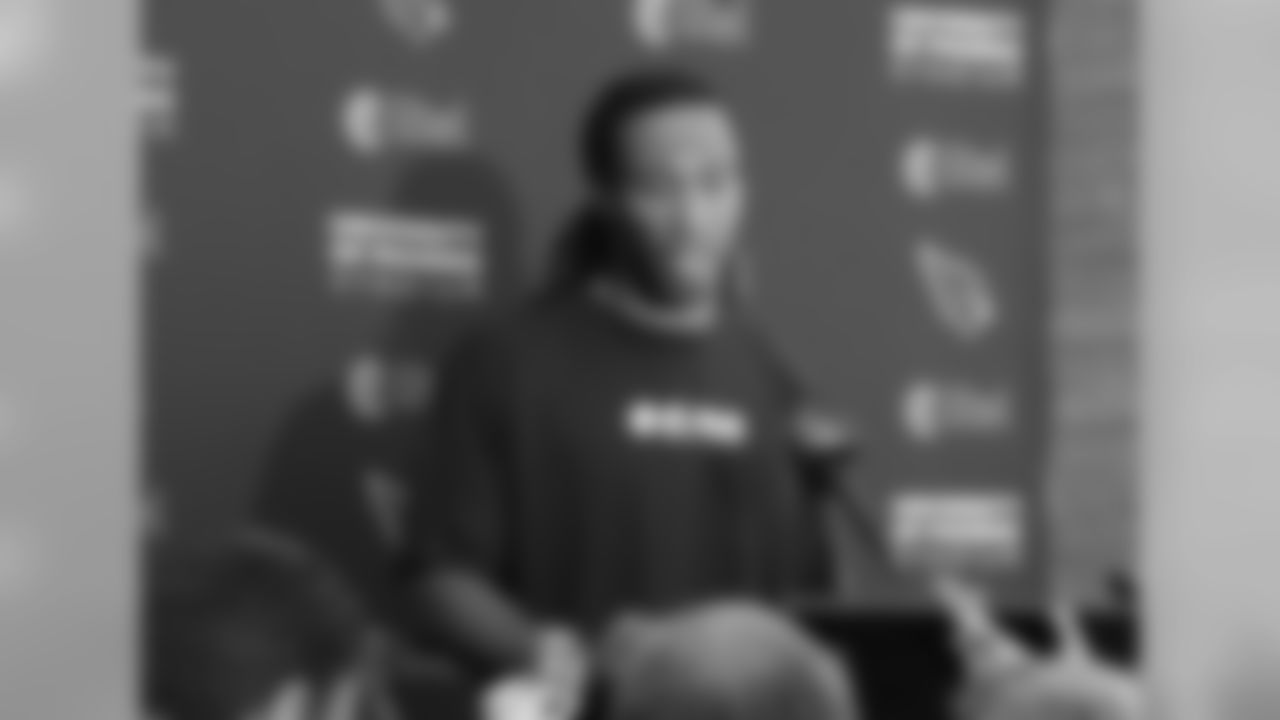
Fitzgerald addresses the media during the week
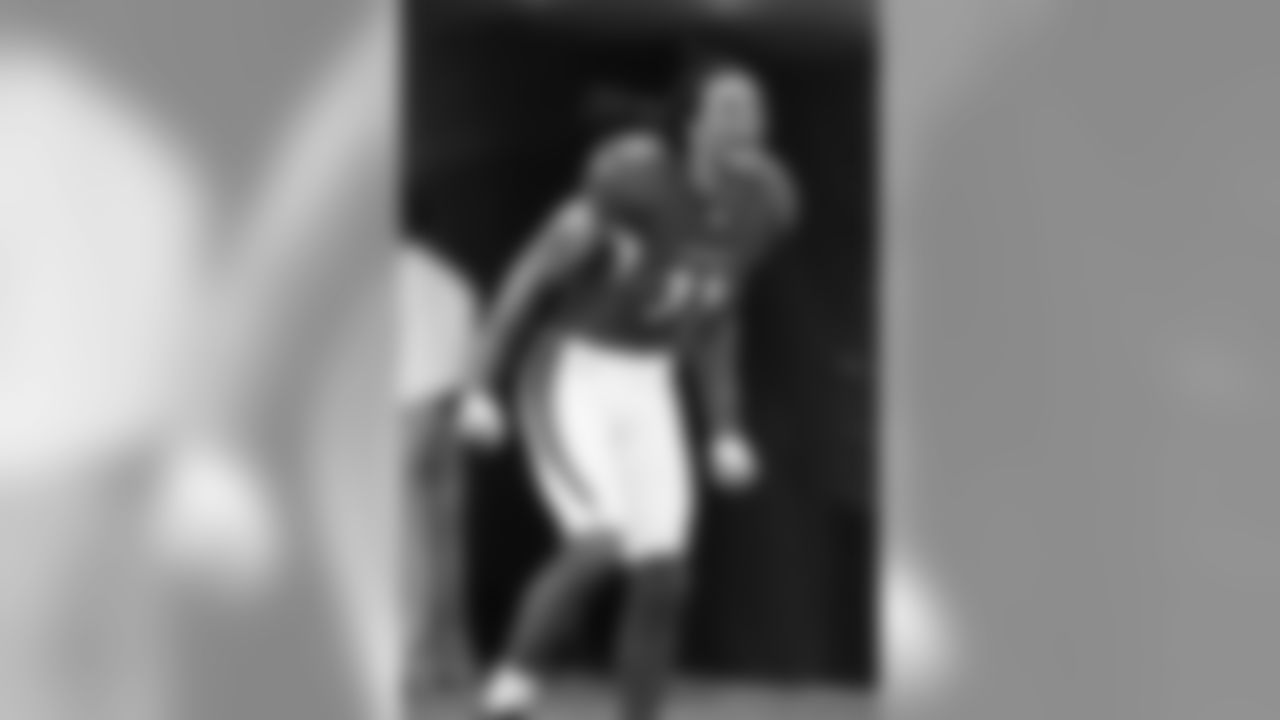
Storming out before the NFC Championship
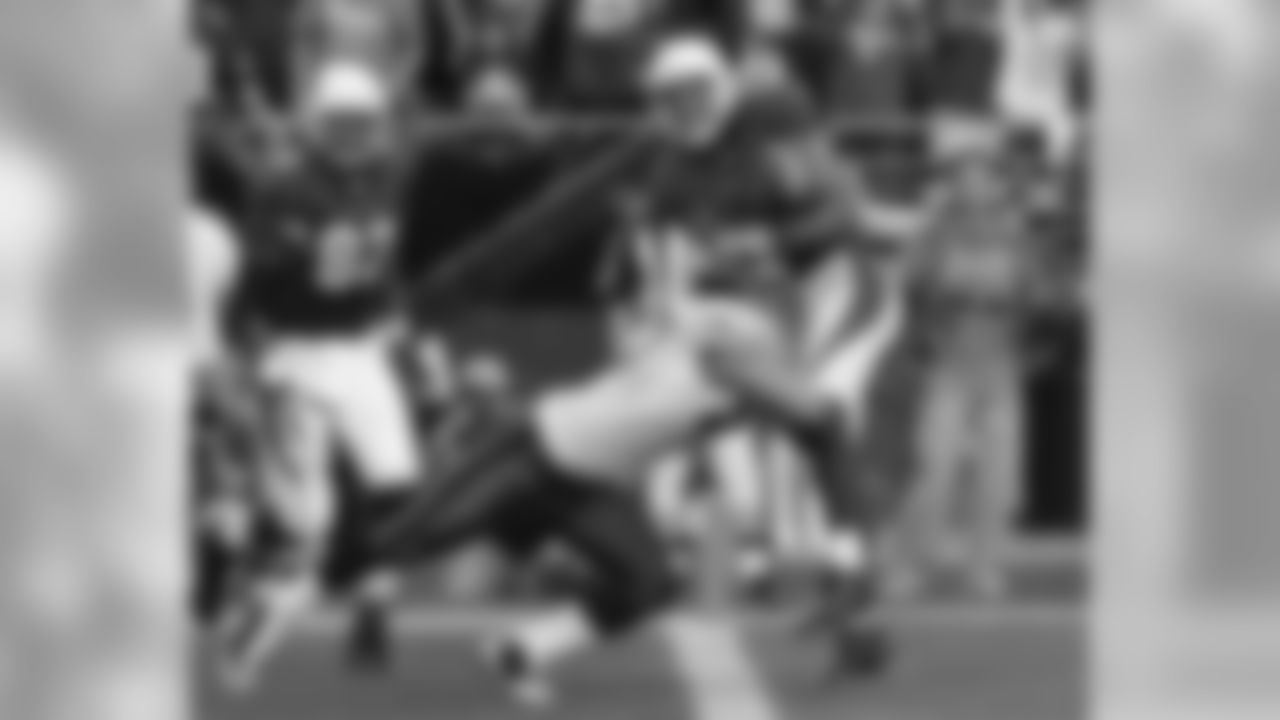
Fitz's first touchdown against the Eagles
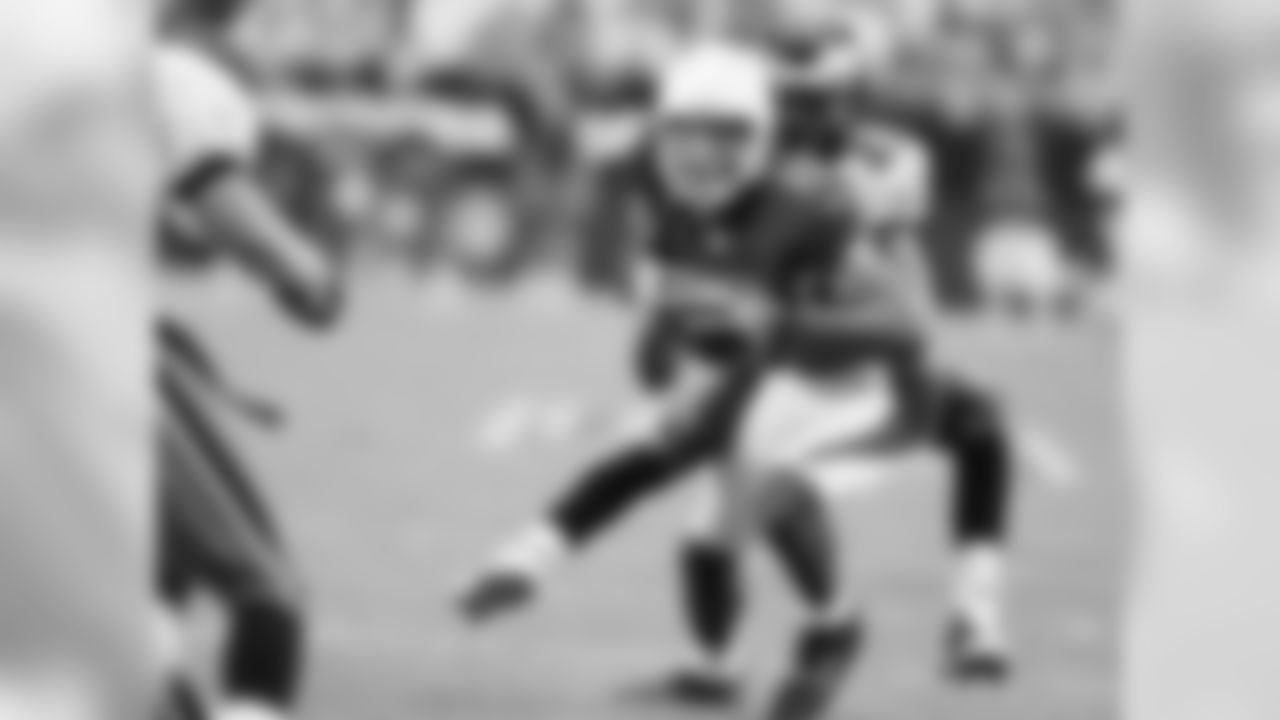
One of Fitzgerald's nine catches in the NFC Championship
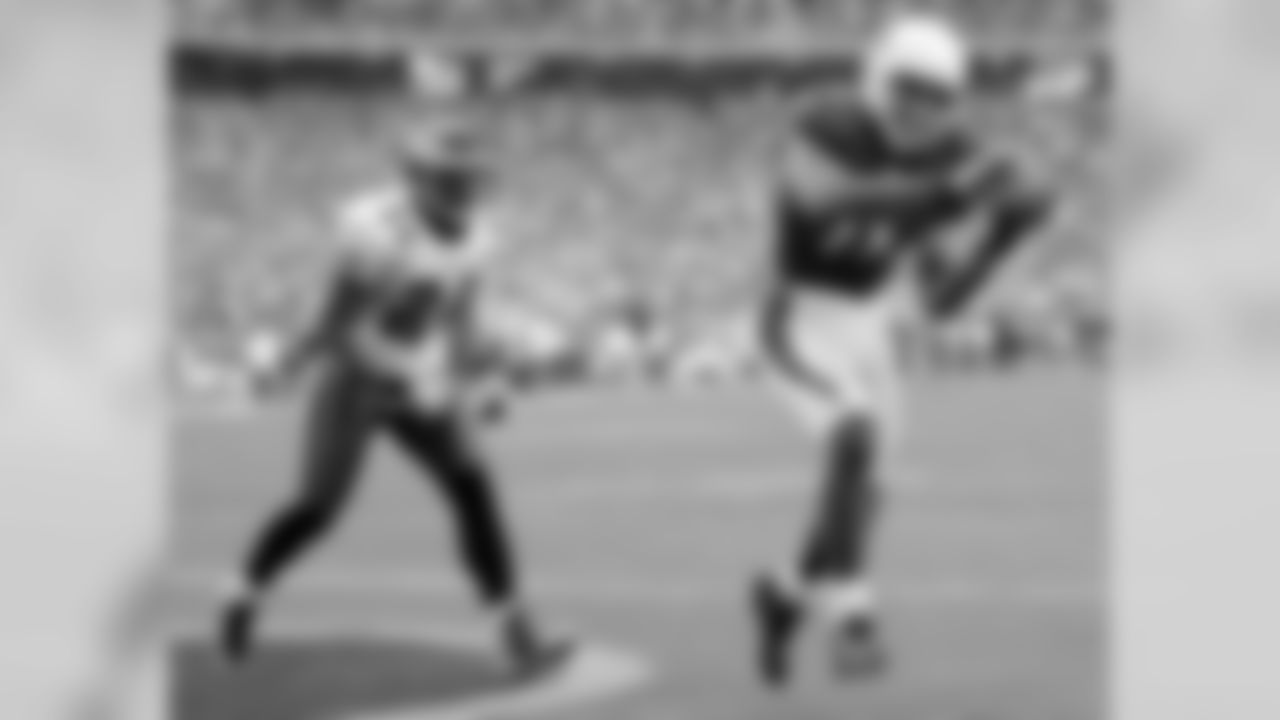
Fitzgerald's second TD in the NFC title game
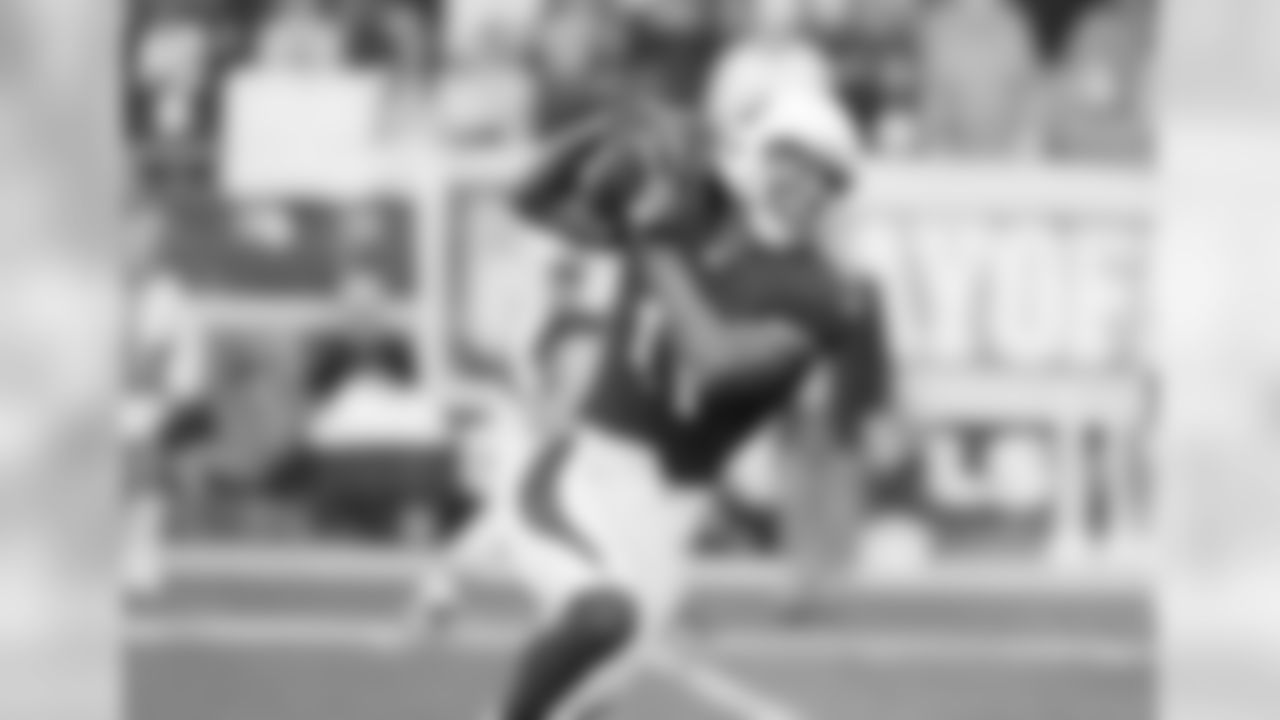
Hauling in the throw-back-pass bomb for a touchdown in the NFC Championship
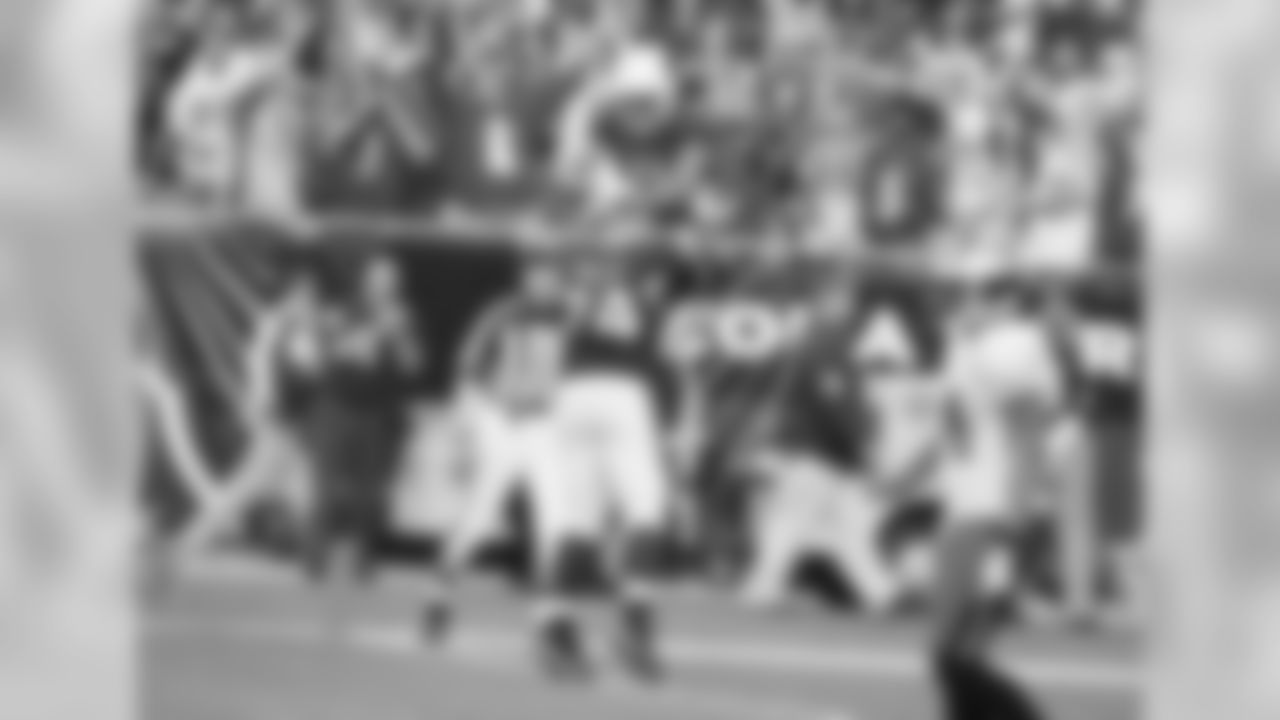
Celebrating his third NFC title game TD with guard Reggie Wells
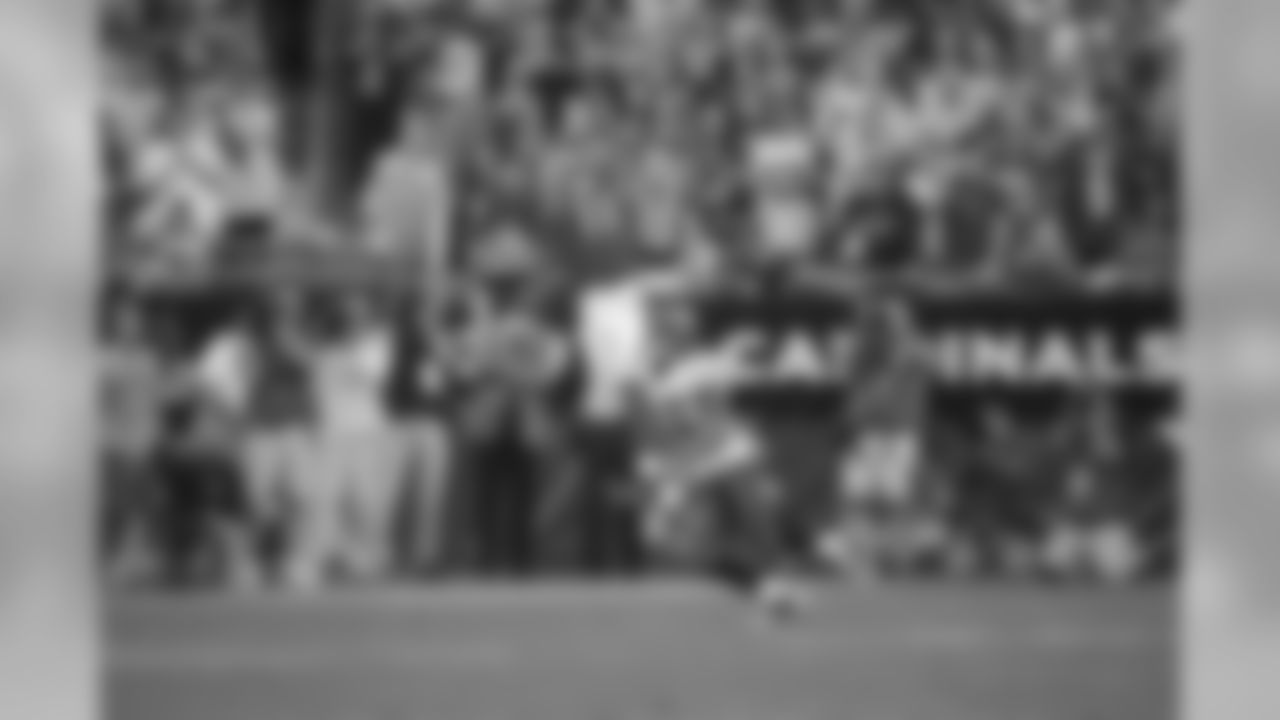
Making a big catch on the Cards' game-winning drive in the NFC Championship
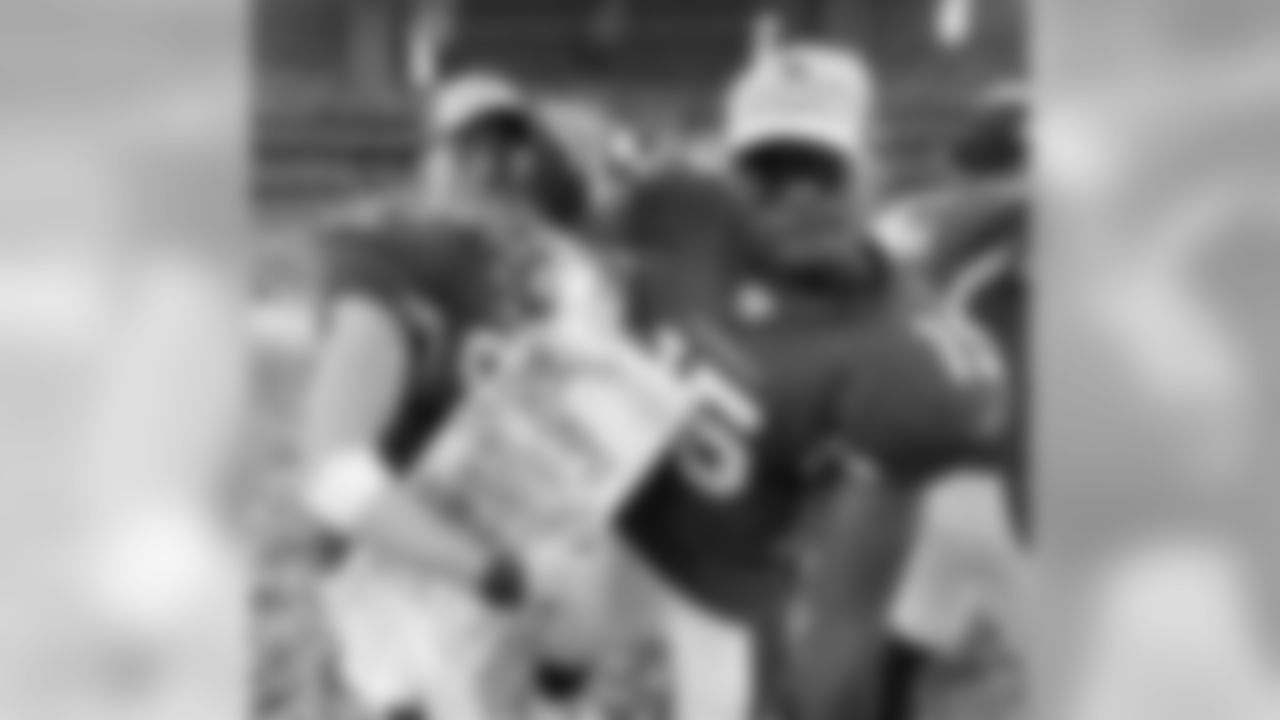
Wide receivers Jerheme Urban and Steve Breaston
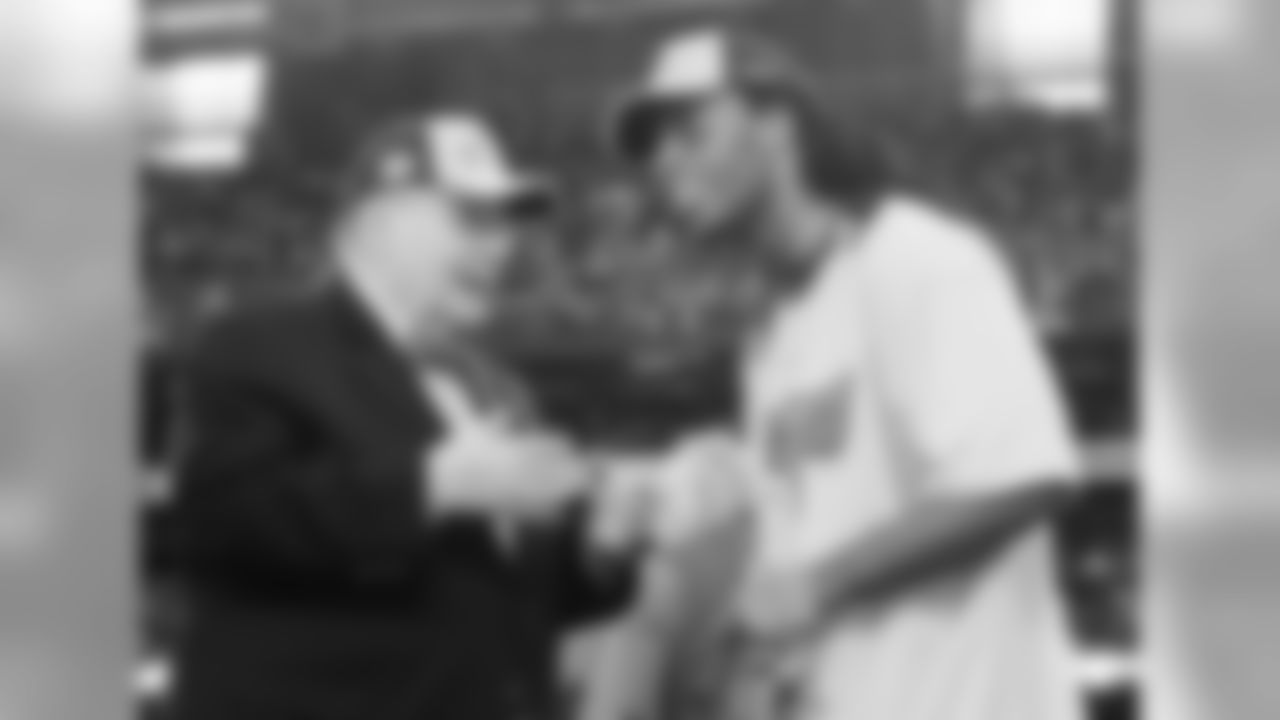
Owner Bill Bidwill and Fitzgerald celebrate going to the Super Bowl
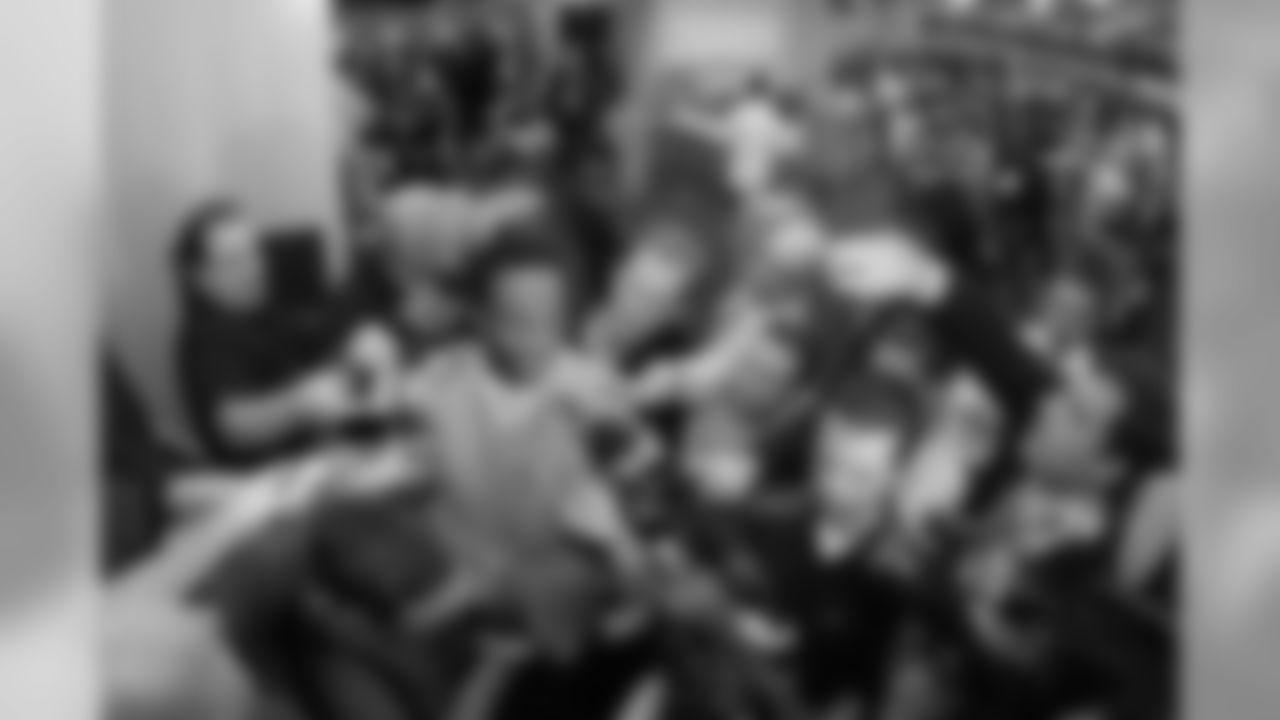
Fitzgerald is surrounded by media after the NFC Championship game
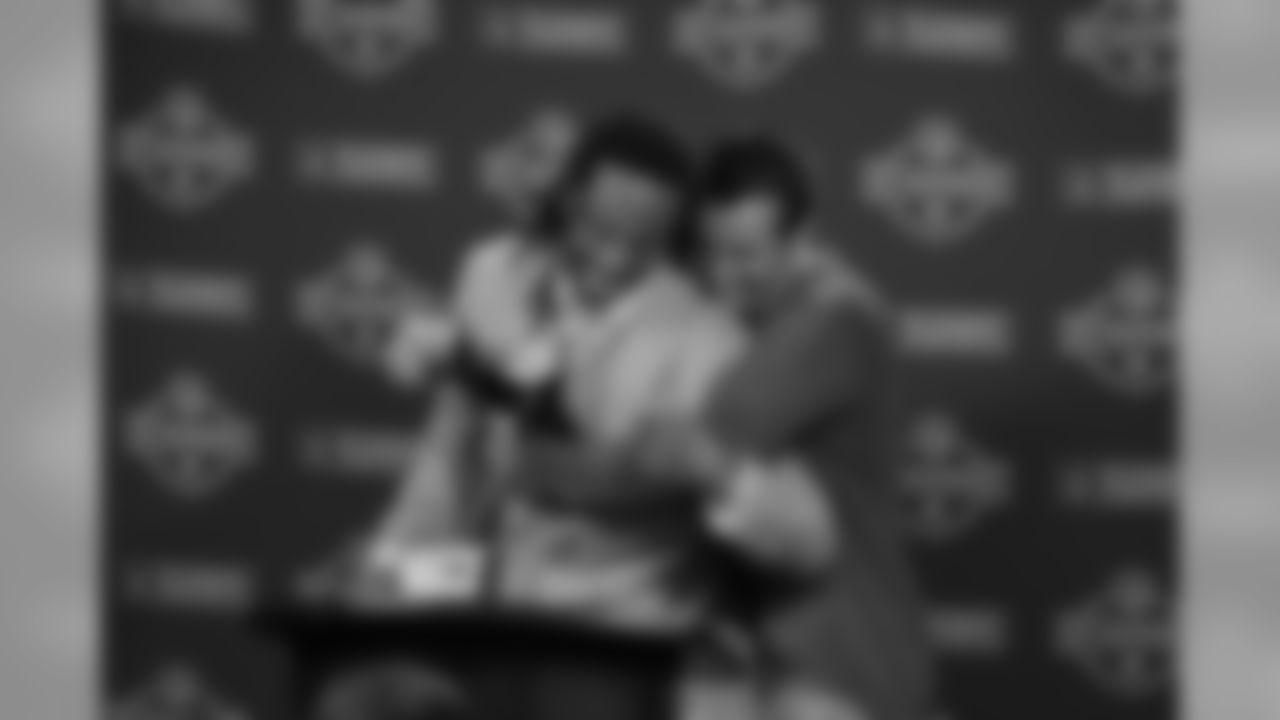
Kurt Warner gives Fitzgerald a hug at the press conference podium after the NFC Championship win

Fitzgerald talks during Super Bowl media day
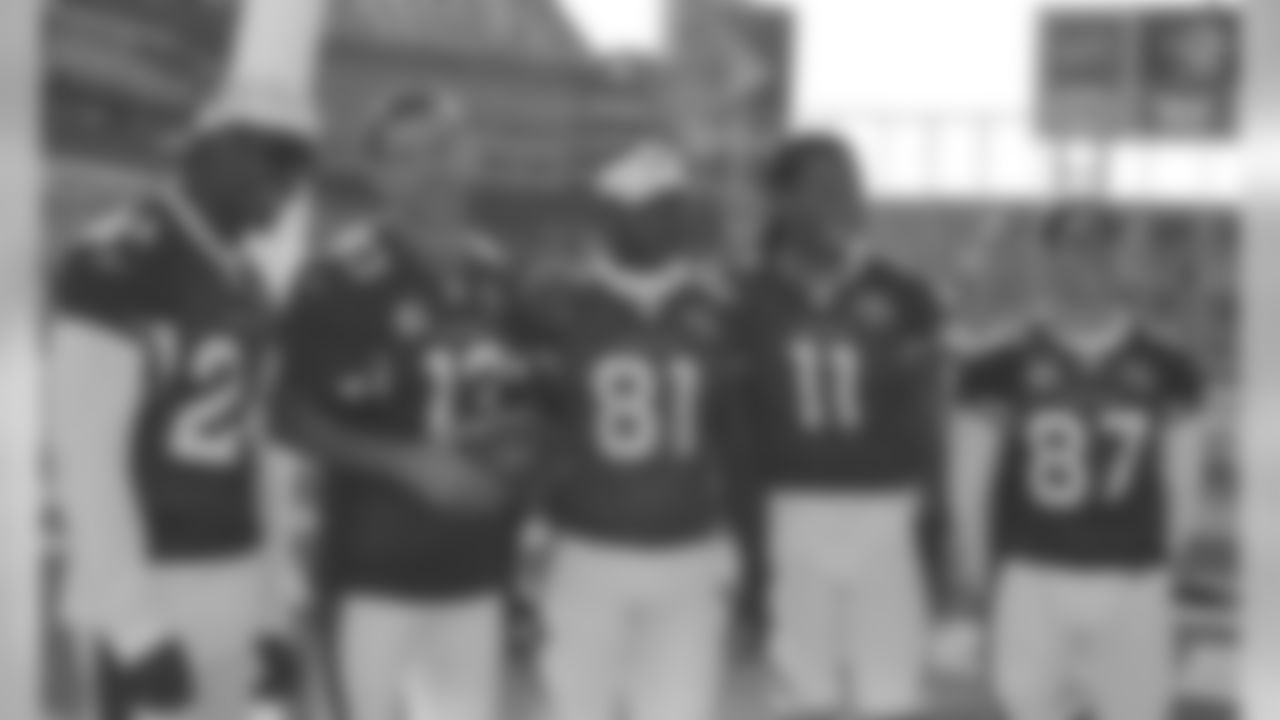
The five Cardinals Pro Bowlers at the Super Bowl: S Adrian Wilson, QB Kurt Warner, WR Anquan Boldin, WR Larry Fitzgerald and special teamer Sean Morey
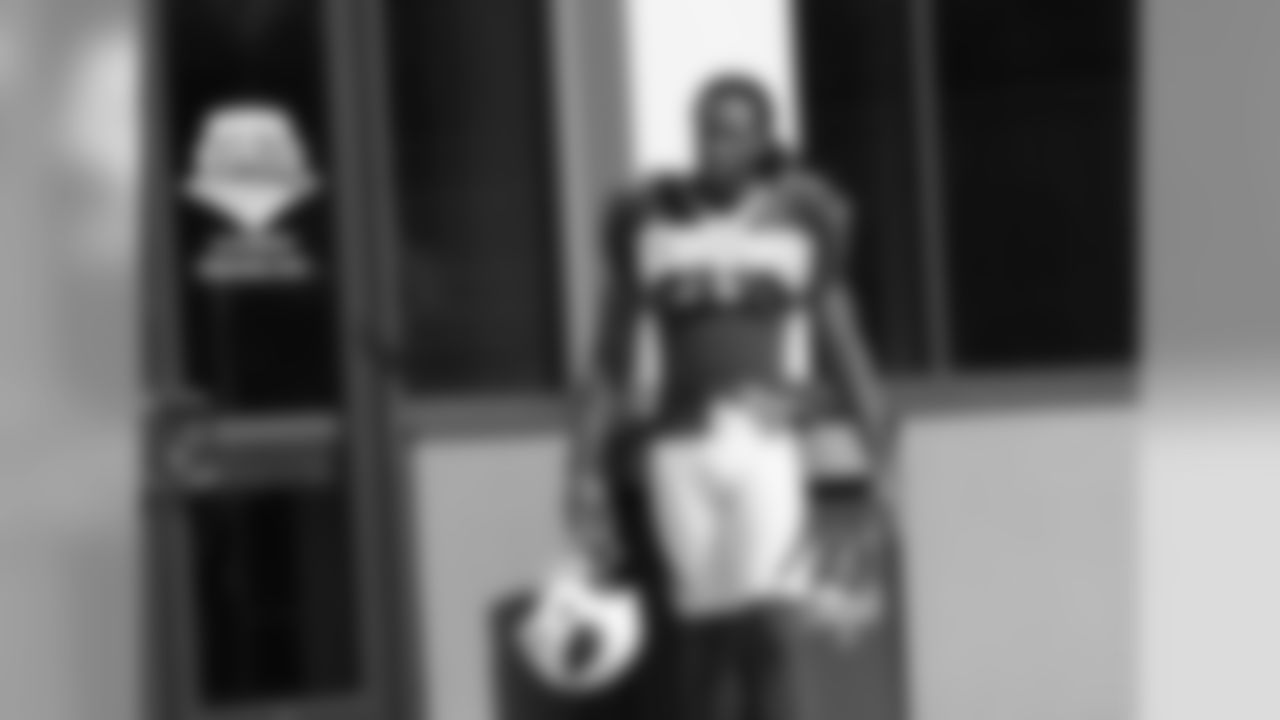
Fitz goes out to practice in Tampa
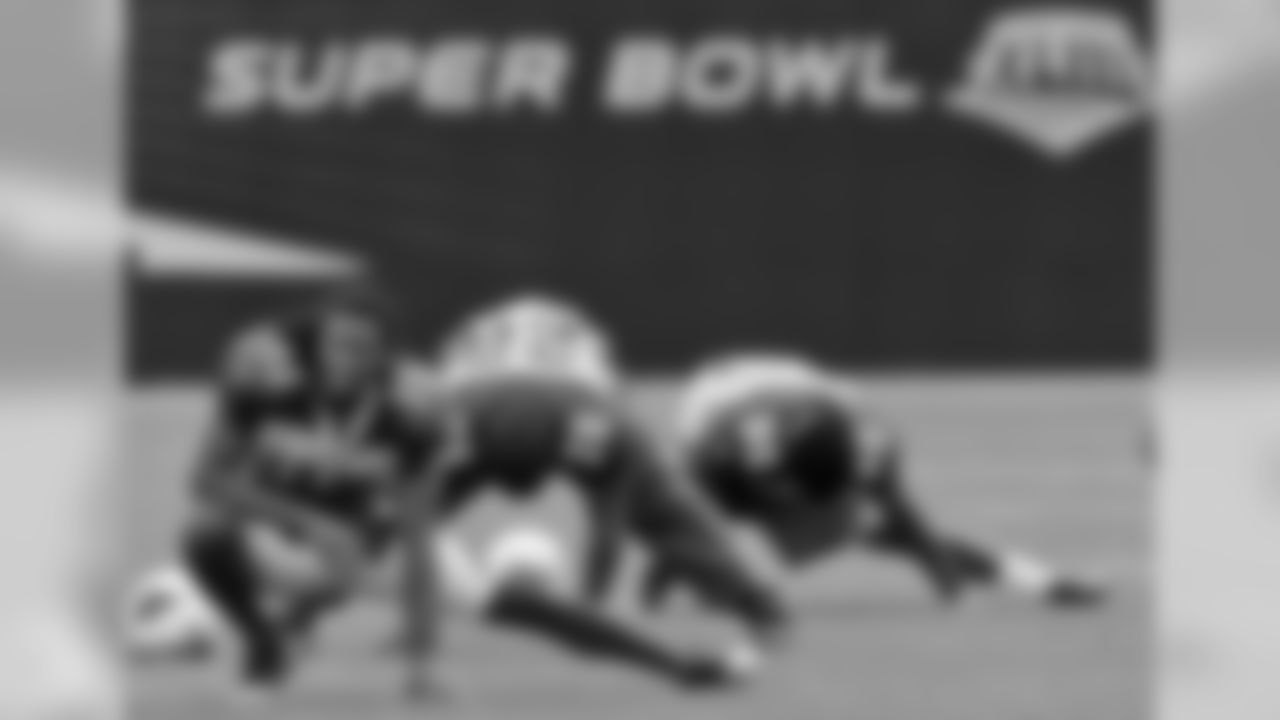
Stretching before a Super Bowl practice
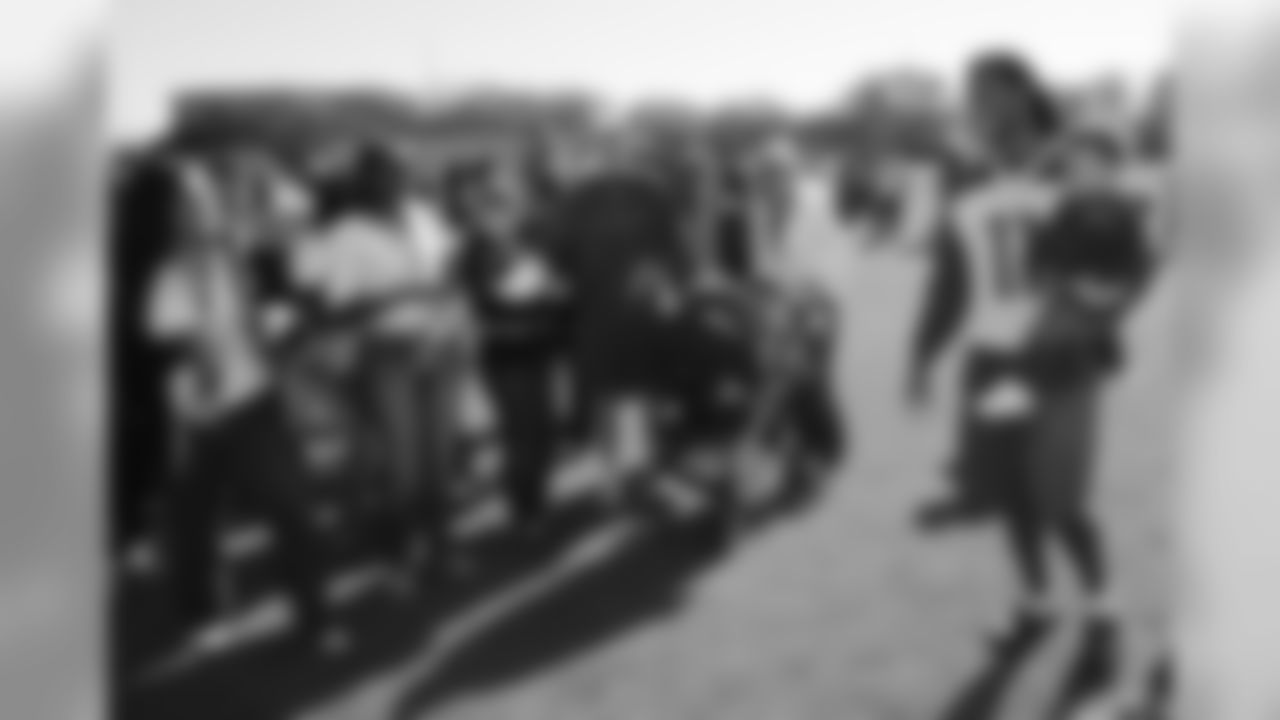
Fitzgerald with son Devin on the Saturday Super Bowl practice
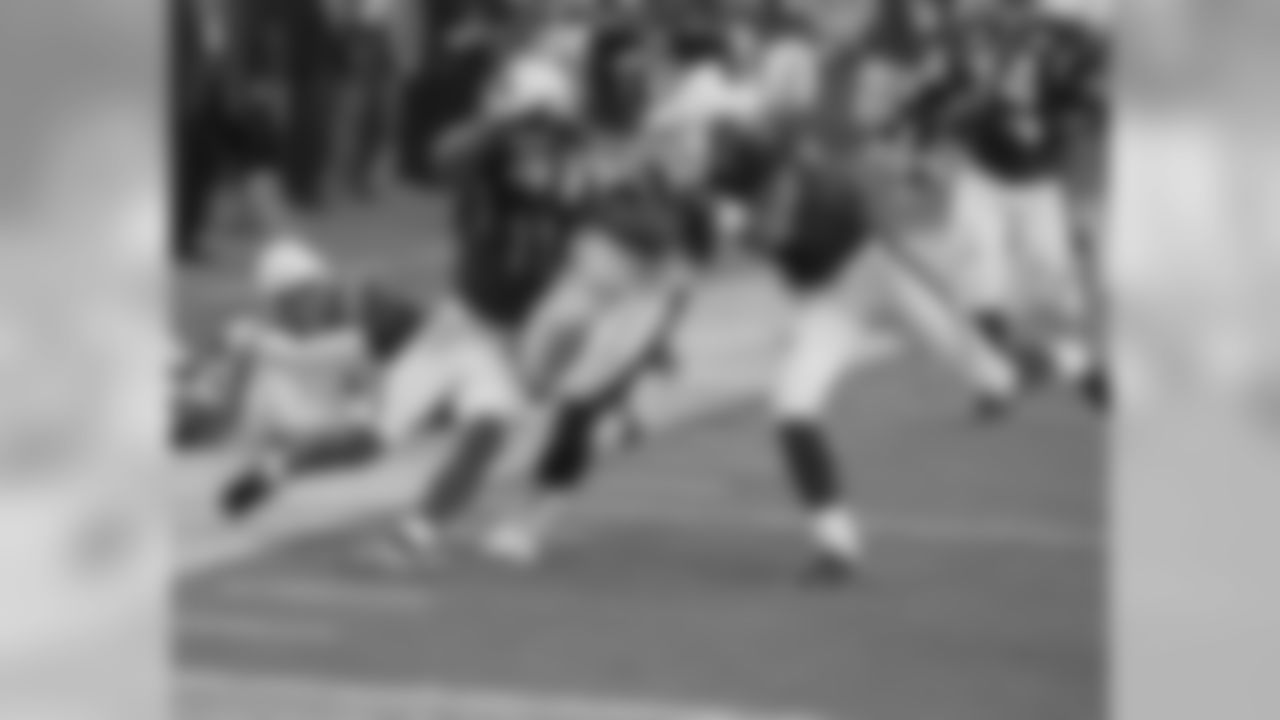
Fitzgerald and Steve Breaston can't pull down Steelers linebacker James Harrison on his 100-yard interception return during the Super Bowl
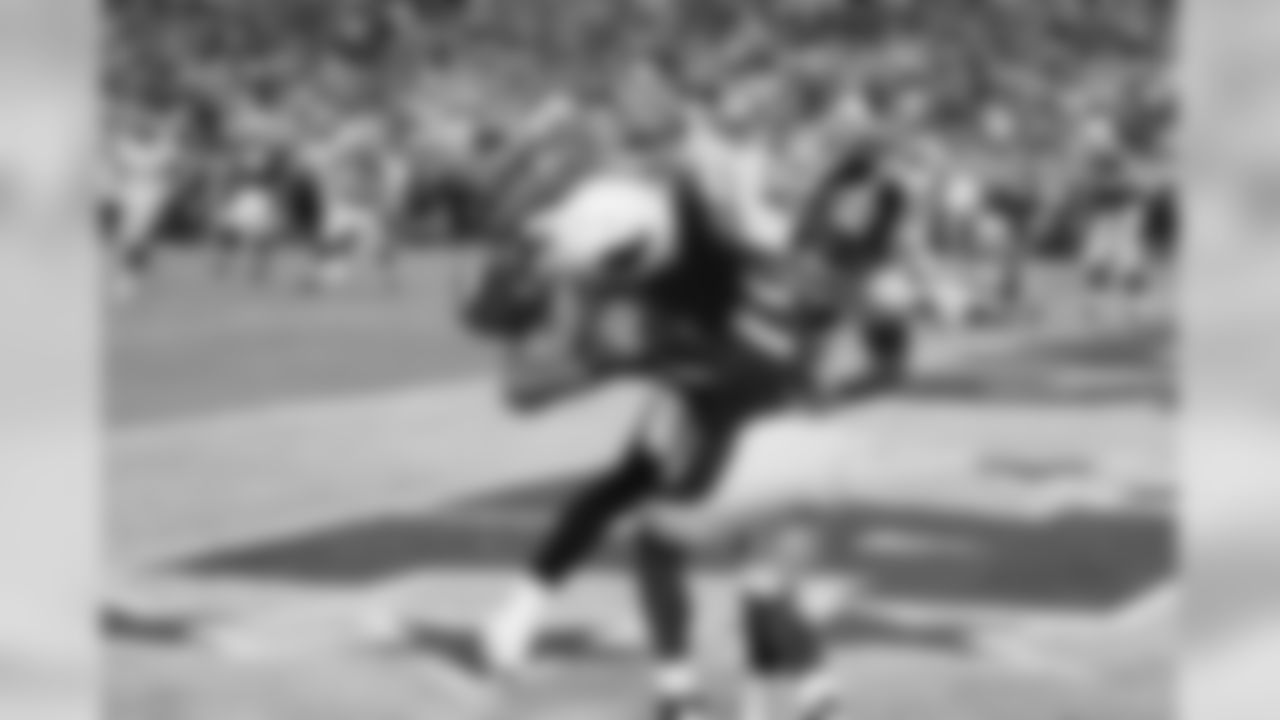
Fitz brings in his first Super TD over Steelers CB Ike Taylor
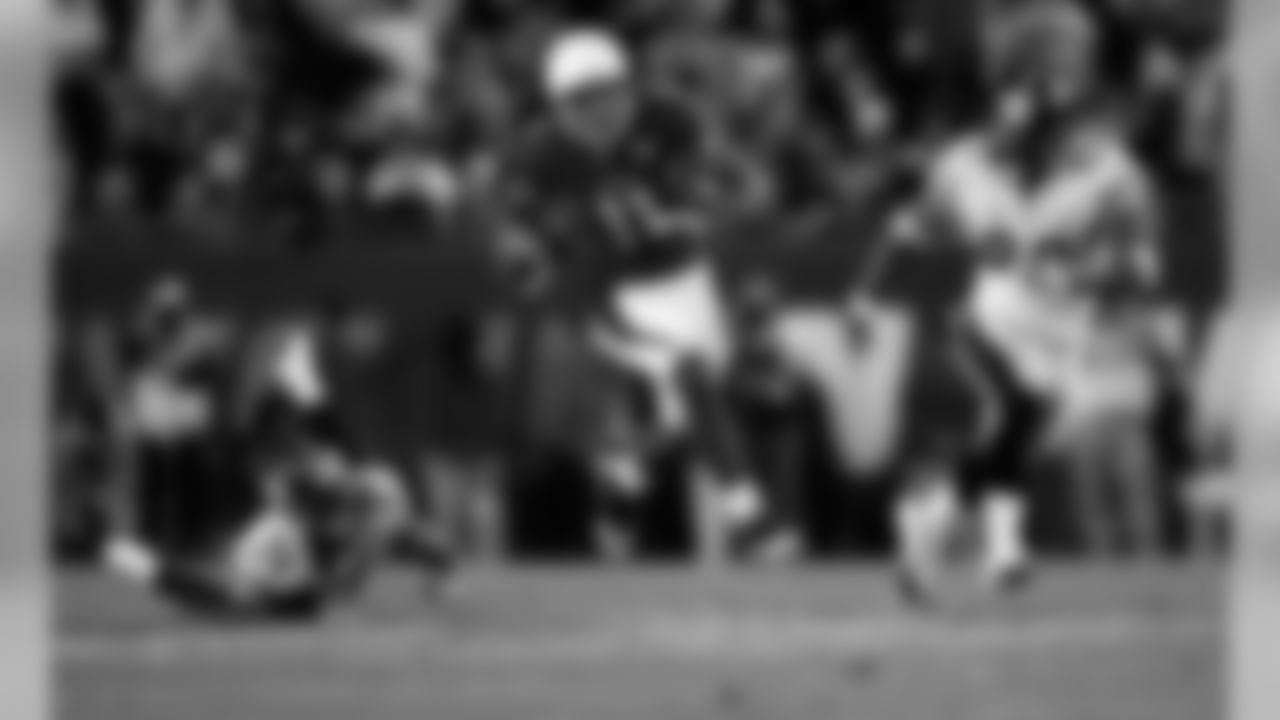
Fitzgerald breaks loose for his 64-yard touchdown catch in the Super Bowl
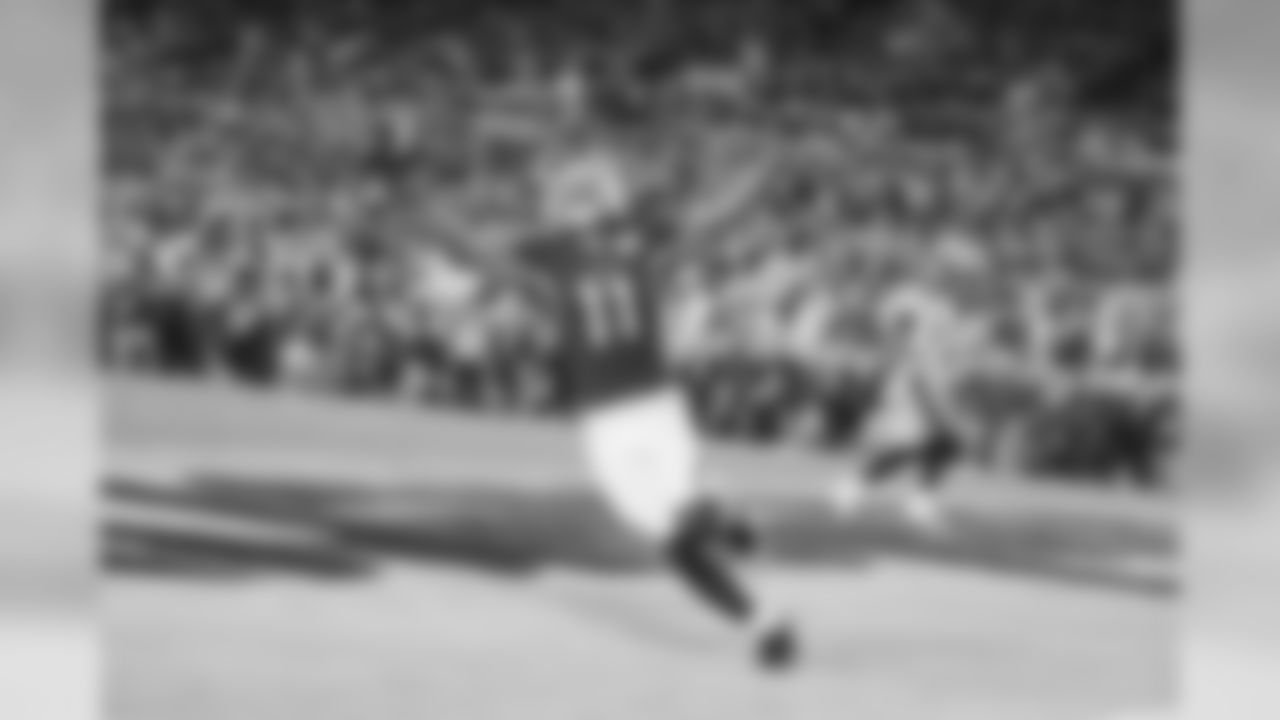
Celebrating after his 64-yard touchdown
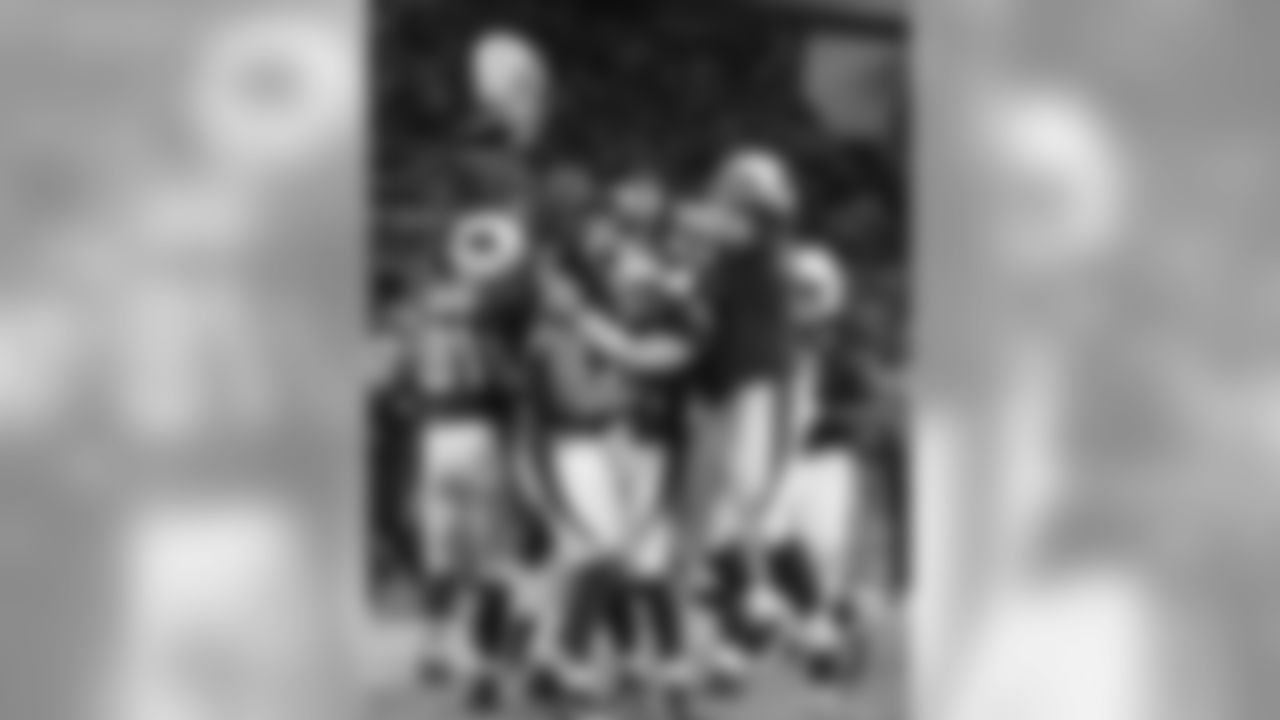
Celebrating after his 64-yard touchdown
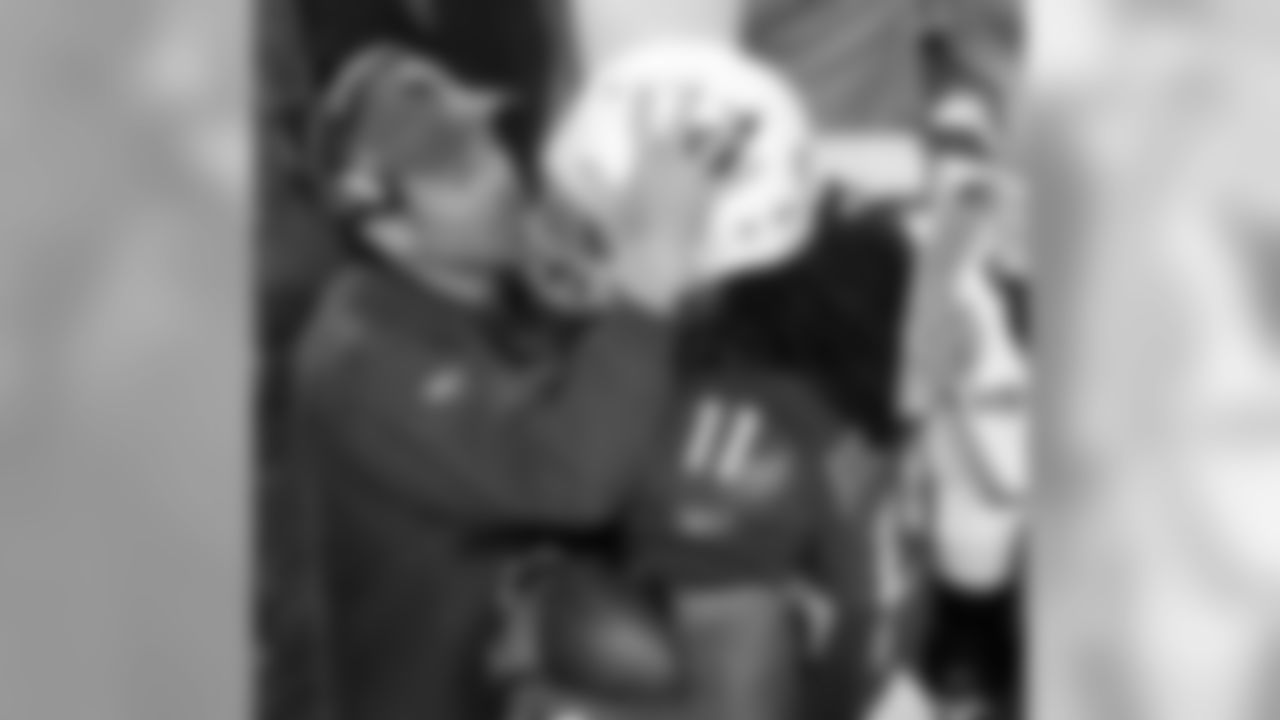
Offensive coordinator Todd Haley celebrates with Fitz after his Super touchdown
Foote, now an assistant coach with the Cardinals: (Feigns ignorance) What Super Bowl are you talking about? I thought we played those guys in the regular season. (Smiles) I don't bring that up that game often around here and I sure as hell ain't going to wear the ring.
Wilson: It was a magical run, and I'm not sure you'll see it again, the impact on games. You'll see great performances, but to consecutively do it and to put a team on his back and do it that way?
Haley: When you look at the whole big picture, with the Cardinals rarely in the playoffs, I mean, I don't think (Fitzgerald's playoff performance) can be touched. Kurt too, but Larry, he put the whole team on his back and said 'We're going to win it' and he did everything he could to get that done. Except tackle James Harrison, because Antrel Rolle was standing in the white.


